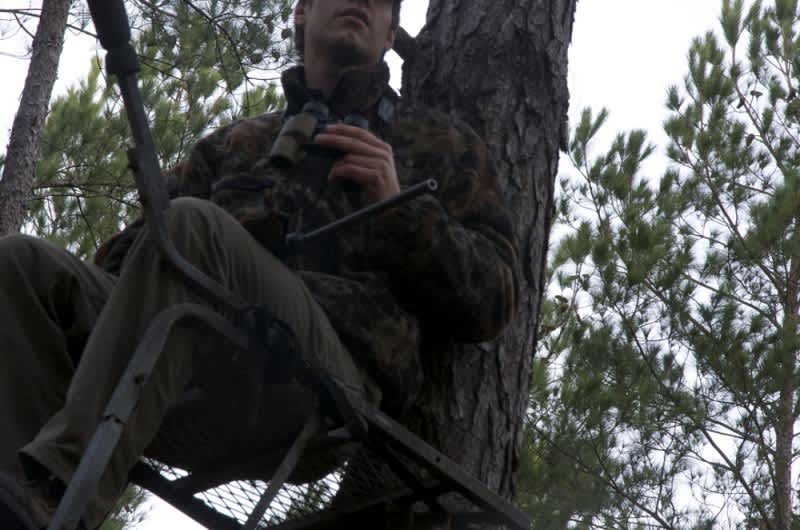A Time to Reflect
Josh Wolfe 01.06.14

Arthur Farrell sat in a deer stand on his modest farm in southern Tennessee, facing west. It has been a hard year for Arthur, who having retired from his law practice several months earlier, now had ample time on his hands. The year was not difficult in terms of hardships and loss, but for a man prone to keeping busy and remaining relative, it was simply not enough to wake each morning at sunrise and drink coffee while reading the paper.
During hunting season, though, Arthur felt replenished and useful to the world, in a “conservation” sense. While he didn’t care to kill a deer with the exception of one big doe or a giant buck per season for meat, he used the woods for therapy in the fall and winter, much like he would the river in spring and summer. In the spring, summer, and early fall, he spent the majority of his waking hours taking care of the deer and turkeys that occasionally visited his back forty, always giving the best chance of harvesting an animal to his son and his son’s friends.
On this particular day in the stand he was ready take a shot if chance allowed. Mary Farrell, Arthur’s wife of more than 30 years, had ordered up some freezer meat for the pending winter, one that would supposedly be the harshest on record. The only beef they purchased was an occasional tenderloin, and other than that it was all venison at the Farrell house.
The wind was not what you would call mighty inviting, and Arthur had thoughts of returning to his truck that was parked over a very lush winter wheat field near the center of his farm. But Arthur figured it’s good for a man to suffer from time to time, facing foreign and unexpected discomfort—as he had while staring down adversity and opposing lawyers in the courtroom. So Arthur puleds the collar of his old brown Filson field jacket up higher around his neck and continued reading Hemingway’s To Have and To Have Not, which always kept him warm—mentally, at least—because it was set in the warmer climes of the world. He’d read a few lines and then look up for a minute or two. Suddenly a small buck trotted nonchalantly across the field before him. Through his binoculars, he could see the seven-point was heavy, but still a young deer, probably no more than two and half years old.
Back in his book, he stopped to ponder Harry Morgan’s predicament and then his further conclusion of making a living by simply having cajones. Arthur recognized the juxtaposition between Harry Morgan and a manual laborer in his employ.
By this time the buck had made its way down the inside of the tree line and has bedded not 50 yards straight down the hill to Arthur’s left. He’s lying below the wind and waiting for a hot doe to come to the field, Arthur thought to himself. He also knew that in his pocket rested a ham and pimento cheese sandwich, which he’d eat if he got hungry during the long, chilly sit; and a flask of whiskey, which he’d drink if he got cold. He continued reading, watching the buck bedded down below, reveling in the day despite the hellish wind. At least this day it was blowing out of the northeast—perfect for where he was sitting in a field known around the farm as the “big barn.”
All of the fields had specific names. Some for as simple a reason as once upon a time a barn, the biggest on the property, sat out where his truck was now parked. Tommy’s Shooting House, which sat about 500 yards below Arthur back to the east, was named after an old farmer who helped Arthur in the early days of the Rocky Top Dove Hunt. Mr. Tommy, as he was known to the kids, once shot a doe out of the elevated shooting house in the early morning after a long night relaxing with a bottle of Tennessee’s finest. The recoil of his .300 Winchester sent him rolling out the back door of the blind and straight to the ground where he simply got up, dusted himself off, and went to retrieve the dead deer.
Arthur smiled at the memory of Mr. Tommy, and shrugged off the pain of his passing. So many stories Arthur and others can tell about the little farm in southern Tennessee where, for the first time in nearly a week, the sun had poked out from behind the clouds in the lower reaches of the western sky. The seven-point had long since meandered off, and a doe stood in the farthest corner of the field. But for now Arthur was content; happy for the sun and the dying wind and the fading light that means warmth is around the corner.
It’s during the week after Christmas that we all deserve to join our friends and family in the woods to reflect on the year behind us and consider the one before us. Much like a favorite sporting scribe, Gene Hill, once said, “Soak it up, go into it softly and thoughtfully, with love and understanding, for another year must pass before you can come this way again.”

